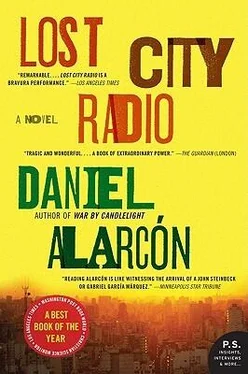The rain let up, and in this new quiet, the evening took on the austerity of a prayer meeting. He answered every question as it came, as well as he could. They had been at it an hour or more when there came the question he would die pondering. Had he ever known the answer? At one time, sure, but that was long ago. The question was posed by the owner of the radio, and there was an innocence to it that Rey appreciated, a genuine need to know, without a hint of malice. “Tell us, sir,” Zahir asked, already speaking of the war in the past tense, “who was right in all of this?”
IT WAS two in the morning when they climbed into Manau’s father’s car and willed it to start. Manau nearly flooded the engine — it had been over a year since he’d driven — but then the ignition caught, and the engine spat bursts of noise. Manau turned to Norma, flashing a satisfied smile that reminded her how young he was. Victor was half-asleep, resting his head in her lap, and she had laid a blanket on top of him. It was a long way to the radio station. The heater was barely working, and the night was unexpectedly cold. The city was still under curfew. They could make it there and be gone before the morning newscast. Before Elmer arrived.
The car moved slowly through the deserted streets, so slowly Norma imagined they were sightseeing. The headlamps splashed dim yellow splotches on the road ahead, and the engine failed twice before they made it to the first blinking red traffic light. Still, there was an air of leisure to the whole endeavor: the pleasing, throaty rumble of the engine, the city passing by in silence. Even the air had an agreeable crispness to it. Block after empty block; and it didn’t seem at this hour to be a city but a museum of a city, a place she was viewing as if from some distant future, an artist’s model built to demonstrate how human beings had once lived.
Manau eased the car down to the seaside highway, where they could see the beach dotted with fires. The tide had gone out, and the sand stretched for a quarter-mile, glowing orange and gold. The ocean, mute and black, pushed into the infinite, and the moonless sky was dark enough to be one and the same with the sea. A row of red lights bobbed at the horizon — the fishing trawlers, where at this hour men were sleeping, resting their bodies for the day’s work ahead. Norma had one hand over the boy, enough to feel him breathe; in the other, she held the list, which had been touched by a dozen people in the past week, had been creased, folded, nearly destroyed, saved, and stolen. It felt good to have it, but not like a victory so much as a reprieve. Ten years had passed, ten years that comprised a vast, inviolable silence, and then these three days, of which, she suspected, she would remember only noise: the chattering dissonance of many voices, sounds at once indistinct and pressing, calling her urgently in different directions. Wounding her, certainly, but no worse than the silence had.
The road rose back to the city, and there, as they came over the hump, was a police checkpoint, brightly lit with flood lamps, a patch of daylight within the darkness. It was still a half-mile ahead, but there was no way around it. The car chugged forward. The boy was still asleep.
“Do I stop?” Manau asked. She could see in the rearview mirror, even in the dim light, that he was afraid.
She bit her lip. “Of course,” Norma said after a moment, and by then, they were there already, there was no choice, and the ordeal was beginning. Or was it simply continuing? In either case, her body tightened, bracing as if for a great impact.
IN TAMOÉ, in the last year of the war, there lived a girl, age five. She didn’t like the army helicopters that flew over her neighborhood. This is what the war meant to her: helicopters blowing up dust and, with their great noise, keeping her dolls awake when she felt they should be resting. A nuisance. Her father had been in hiding for two years, fighting with the IL. He was an expert explosives man named Alaf. Before he left the family forever, he told his daughter that if soldiers ever came to the house, she should spit on them. He was a true believer. “Say it with me,” Alaf whispered. “They’re animals.”
“They’re animals,” the little girl repeated. She was three years old then.
“What will you do when they come?”
“Spit on them,” she answered and then began to cry. Two years later, she could not remember her father: not what he looked like, not the sound of his voice. Nor would her mother speak of him.
After she was killed by a stray bullet, a battle began in her name. Not spontaneously. The IL had been waiting for a blameless victim. She lived in a corner house without running water or electricity, a house that was always damp and cool and smoky. Its second story had not been completed, and so the roof was sometimes used by neighborhood IL snipers to pick off soldiers who patrolled the area. An army commander made the entirely reasonable decision to put an end to this nonsense. The girl was small for her age, and always had a cough. The day she died, she had not eaten enough and was walking to her friend’s house, hoping to be offered a piece of bread. Though she was hungry, she was also proud, and had resolved not to ask for it. But if it were offered —this, she had decided, was entirely different. Her mother was at the market, and there were shooters on her roof. Later, men would argue about which way she fell, the possible trajectories of the bullet or bullets that killed her, but the truth is, neither the army nor the IL snipers much noticed her when she first went down. Certainly, no one intended to kill her. The fighting continued for another half-hour. She had hidden behind an oil drum when the shooting began. She would later be described as holding a doll, as flaxen-haired and innocent, and she may have been all these things, but when she died, no one noticed her, just as no one had noticed her when she lived. Later, her face was put on banners that were carried to the edge of the district and then into the heart of the city by hundreds of well-meaning and outraged people who had never known her. They were met with bullets in the plaza that would be razed and renamed Newtown Plaza. There, many more people died, and then the war was over.
Her father never knew that his daughter died in this way, but it would be a mistake to say he was unaffected. The bond between parent and child is chemical, fierce, and inexplicable, even if that parent is a sworn killer. This connection cannot be measured; it is at once more subtle and more powerful than science. In the days before his daughter was murdered, Alaf felt a pain in his chest. For two nights, he couldn’t sleep. He ate little, and even went so far as to take his own temperature. He was certain he was dying, and he despaired. In his mind, Alaf began to compose a letter to send to his wife and daughter back in Tamoé, asking for forgiveness. He wondered if his daughter could read by now. How long had it been? How did any of this happen? He promised to learn a useful trade and devote himself to it. He described the exotic charms of a quiet and peaceful life, and it made his heart quicken: late breakfasts on Sundays, afternoons dedicated to home repair or to listening to a soccer match on the radio. He might walk his daughter to school on Monday. He and his wife might have a son. Or, it struck him, they could leave the city altogether and settle here, in the endless jungle where land was plentiful and the soil fertile. A small farm, he thought, and set about imagining a life he would never have. Of course, he did not actually write the letter, and so he did not send it. He died a few days after the Battle of Tamoé, not far from 1797, killed in an ambush before he so much as fired a shot.
Читать дальше












